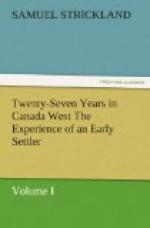Bruin, however, being possessed of considerable pluck, immediately faced about and attacked the major, who gave him a taste of the buttons, as he advanced. But the bear, nothing daunted, returned to the charge, which Elliott met with a blow from the butt-end of his gun, that was instantly struck from his hand by his formidable antagonist, who immediately closed with him. It now became a regular stand-up fight between Major Elliott and Ursus Major. For a long time it was doubtful which would come off victorious. Elliott was severely wounded about the breast and arms; notwithstanding which, he boldly maintained his ground, and ultimately succeeded in rolling the beast over the trunk of a large pine tree which lay on the ground beside them. Bruin was too much exhausted to climb over the tree, to renew the combat.
Luckily, Elliott received no internal injury, though his flesh was severely lacerated in the contest, which only ended with the bear’s life. Ireland, indeed, never sent from her shores a bolder hunter, braver man, or more active backwoodsman, than Major Elliott.* [* This gentleman was afterwards returned as Member of the Provincial Parliament for the county of Durham.]
CHAPTER XI.
CANADA THE POOR MAN’S COUNTRY. — DISADVANTAGES OF INEXPERIENCE. — TOWNSHIP OF HARVEY SETTLEMENT. — PAUPER EMIGRATION. — SUPERIOR ADVANTAGES OF THE LABOURER COLONIST. — TEMPERANCE AND TEMPERANCE SOCIETIES. — A DRY ANSWER TO WATERY ARGUMENTS. — BRITISH AND FOREIGN TEMPERANCE SOCIETY.
There is no colony belonging to the British Crown better adapted for the poor industrious emigrant than the Canadas, particularly the Upper Province, which is essentially the poor man’s country. Twenty-five years ago, the expense of the voyage out to Quebec, and the difficulty, delay, and additional outlay of the inland journey put it completely out of the power of the needy agriculturist or artizan to emigrate; the very classes, however, who, from their having been brought up from their infancy to hard labour, and used to all sorts of privations, were the best fitted to cope with the dangers and hardships attending the settlement of a new country. The impossibility of the working hand raising funds for emigration, confined the colonists to a set of men less calculated to contend with difficulties—namely, half-pay officers and gentlemen of better family than income, who were almost invariably the pioneers of every new settlement.
Many high-spirited gentlemen were, doubtless, tempted by the grants of land bestowed upon them by the Government, which made actual settlement one of the conditions of the grant. It followed, as a matter of course, that the majority of these persons were physically disqualified for such an undertaking, a fact which many deserted farms in the rear townships of the county in which I reside painfully indicate.




